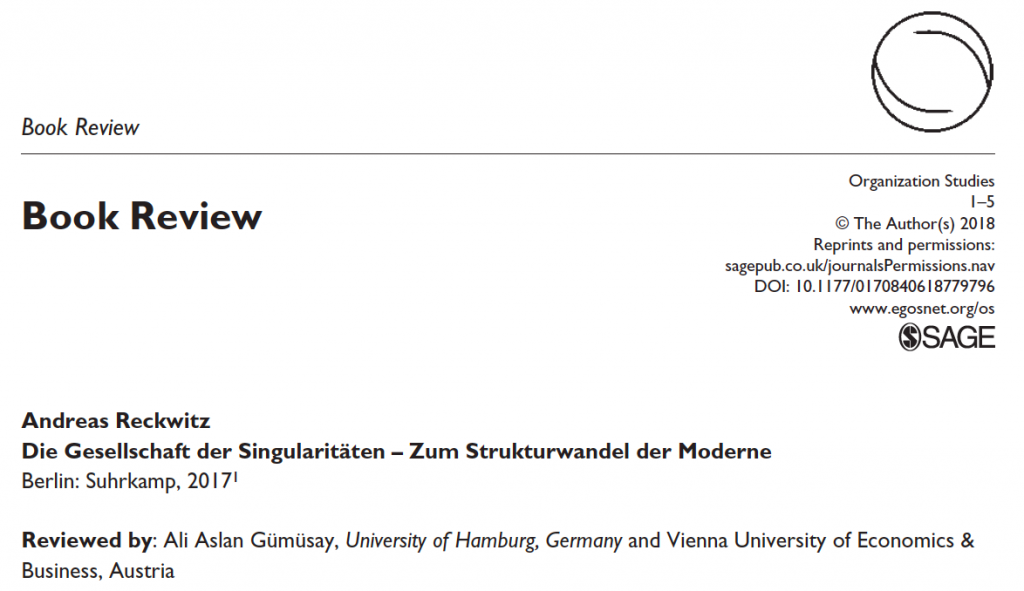New review of the book “The Society of Singularities” by Andreas Reckwitz published in Organization Studies.
“Reckwitz offers a grand social theory of late modernity. His quest is to comprehend and conceptualize the social present. The gist of the book’s argument is that in modernity a societal structural transformation has occurred: the societal logic of the particular has taken precedence over the logic of the general. Reckwitz denotes the distinctive character, which is neither changeable nor comparable, as singularity. Both individuals and collectives, such as groups, organizations, or social movements, may seek exceptionalism. We curate and perform our lives and strive for authenticity, attraction, and positive valuation to generate short-term affective experience and long-term cultural value. This fits squarely with core organization studies concerns and arenas of attention of ‘organizations, organizing and the organized in and between societies’ and has the potential to shape organization theories’ depiction and prediction of social reality.” Unfortunately, wonderful comments by Andreas Reckwitz himself, Daniel Geiger and Oskar Piegsa had to be taken out during the review process. So I’d like to share them here:
Unfortunately, wonderful comments by Andreas Reckwitz himself, Daniel Geiger and Oskar Piegsa had to be taken out during the review process. So I’d like to share them here:
Andreas Reckwitz: “The motive of my book was to clarify which consequences the reversal of a phenomenon at the margin into a dominant structure has in society. What happens if the orientation towards the singular, the extraordinary, the authentic – which in classical, industrial modernity was a side-phenomena – turns in late-modernity into a structure everything and everybody strives for and expects?”
Daniel Geiger: “For me this book is a perfect example to prove the analytical richness and explanatory power of a practice lens for studying organizations, the organized and societies. Reckwitz manages to connect the texture of different practices which cannot be studied in isolation – something that is often forgotten in recent practice-based studies. The idea of singularization and the valorization practices that are practiced in economics, culture, and life-stiles have a great potential to explain late modern societies. For me the book holds up a mirror to my own life. In a sense I would argue it is the new “Social Systems” (Luhmann, 1995) for the 21st century.”
Oskar Piegsa: “In Reckwitz I discovered quite a few theories that have been floating around in journalism and in the humanities in recent years. I found traces of David Brooks’ (2000) bourgeois bohemians and of Boltanski and Chiapello’s (1999) ‘Le nouvel Ésprit du Capitalisme’, to name only two. This is not to suggest his work is a meta-study or epigonal. ‘Singularities’ is highly original and its greatest purpose is in providing a grand theory that seems to explain a lot of what is happening today in culture and society. Where others described parts of contemporary culture, Reckwitz tackles the whole thing, all of it. However, I wonder if Reckwitz doesn’t overestimate the value of narrative, originality, and creative work. He argues that every college graduate today works in some way creatively, adding immaterial value to material things. I doubt that. And I’m afraid that categories such as ‘creative work’ or ‘cultural industries’ will lose their descriptive value if we apply them to, well, everything.”